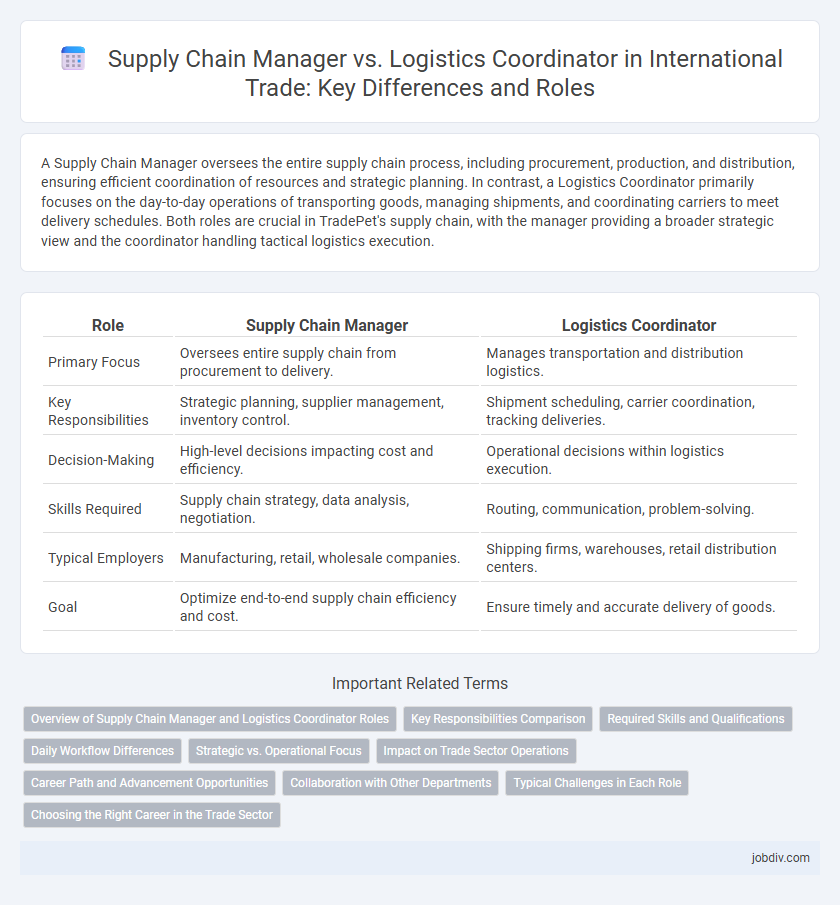A Supply Chain Manager oversees the entire supply chain process, including procurement, production, and distribution, ensuring efficient coordination of resources and strategic planning. In contrast, a Logistics Coordinator primarily focuses on the day-to-day operations of transporting goods, managing shipments, and coordinating carriers to meet delivery schedules. Both roles are crucial in TradePet's supply chain, with the manager providing a broader strategic view and the coordinator handling tactical logistics execution.
Table of Comparison
| Role | Supply Chain Manager | Logistics Coordinator |
|---|---|---|
| Primary Focus | Oversees entire supply chain from procurement to delivery. | Manages transportation and distribution logistics. |
| Key Responsibilities | Strategic planning, supplier management, inventory control. | Shipment scheduling, carrier coordination, tracking deliveries. |
| Decision-Making | High-level decisions impacting cost and efficiency. | Operational decisions within logistics execution. |
| Skills Required | Supply chain strategy, data analysis, negotiation. | Routing, communication, problem-solving. |
| Typical Employers | Manufacturing, retail, wholesale companies. | Shipping firms, warehouses, retail distribution centers. |
| Goal | Optimize end-to-end supply chain efficiency and cost. | Ensure timely and accurate delivery of goods. |
Overview of Supply Chain Manager and Logistics Coordinator Roles
Supply Chain Managers oversee the end-to-end supply chain process, including procurement, production, inventory management, and distribution to optimize efficiency and reduce costs. Logistics Coordinators focus on the day-to-day transportation, warehousing, and shipment scheduling to ensure timely delivery of goods. Both roles require strong organizational skills, but Supply Chain Managers typically handle strategic planning while Logistics Coordinators execute operational tasks.
Key Responsibilities Comparison
Supply Chain Managers oversee the entire supply chain process, including procurement, production planning, inventory management, and supplier relationship management to optimize efficiency and reduce costs. Logistics Coordinators focus primarily on coordinating transportation, managing shipment schedules, tracking deliveries, and ensuring timely distribution of goods. Both roles require collaboration with suppliers and internal teams, but Supply Chain Managers have broader strategic responsibilities while Logistics Coordinators handle day-to-day operational logistics.
Required Skills and Qualifications
Supply Chain Managers require advanced skills in strategic planning, inventory management, and data analysis, often holding degrees in supply chain management or business administration with certifications like APICS CSCP. Logistics Coordinators focus on operational skills such as route planning, shipment tracking, and vendor communication, typically needing a background in logistics, transportation, or related fields and proficiency with logistics software. Both roles demand strong problem-solving abilities and knowledge of compliance regulations, but Supply Chain Managers emphasize leadership and cross-functional coordination, while Logistics Coordinators prioritize day-to-day execution and detail orientation.
Daily Workflow Differences
Supply Chain Managers oversee strategic planning, supplier negotiations, and inventory forecasting to optimize the end-to-end supply chain, ensuring cost efficiency and timely delivery. Logistics Coordinators focus on daily operational tasks such as scheduling shipments, tracking freight, and resolving transportation issues to maintain smooth warehouse and distribution center functions. The Supply Chain Manager's workflow involves high-level decision-making and cross-functional collaboration, whereas the Logistics Coordinator handles real-time execution and immediate problem-solving on the ground.
Strategic vs. Operational Focus
A Supply Chain Manager oversees end-to-end supply chain strategy, optimizing processes to enhance efficiency, reduce costs, and align with long-term business goals. In contrast, a Logistics Coordinator manages day-to-day operational tasks, such as shipment scheduling, inventory tracking, and addressing immediate logistical challenges. The strategic focus of supply chain management drives overall supply network performance, while logistics coordination ensures seamless execution of transportation and distribution activities.
Impact on Trade Sector Operations
Supply Chain Managers strategically oversee the end-to-end flow of goods, optimizing procurement, production, and distribution to enhance efficiency and reduce costs in trade sector operations. Logistics Coordinators focus on the tactical management of transportation, warehousing, and inventory control, ensuring timely delivery and accuracy in shipments. Both roles critically impact trade by improving operational agility, minimizing delays, and supporting global supply chain resilience.
Career Path and Advancement Opportunities
Supply Chain Manager roles typically require extensive experience in strategic planning and offer advancement opportunities into senior management positions such as Director of Supply Chain or Chief Operations Officer. Logistics Coordinators often start with operational duties and can advance by gaining expertise in inventory management and transportation, eventually moving into supply chain analyst or supervisory roles. Career progression for Supply Chain Managers emphasizes leadership and cross-functional management, while Logistics Coordinators build foundational skills before transitioning into broader supply chain responsibilities.
Collaboration with Other Departments
A Supply Chain Manager collaborates extensively with procurement, production, and sales departments to optimize end-to-end supply chain efficiency, ensuring seamless integration and strategic alignment across functions. In contrast, a Logistics Coordinator primarily interacts with warehouse, transportation, and customer service teams to manage daily shipping schedules, inventory levels, and delivery performance. Both roles require strong cross-departmental communication but differ in scope, with the Supply Chain Manager focusing on broader supply chain strategy and the Logistics Coordinator handling operational logistics execution.
Typical Challenges in Each Role
Supply Chain Managers commonly face challenges in demand forecasting accuracy, supplier relationship management, and aligning supply chain strategies with business goals. Logistics Coordinators often encounter issues related to shipment scheduling, real-time tracking of goods, and resolving transportation delays. Both roles require effective communication and problem-solving to ensure seamless product flow from suppliers to customers.
Choosing the Right Career in the Trade Sector
Supply Chain Managers oversee end-to-end operations, including procurement, production, and distribution, ensuring efficient flow of goods in global trade networks. Logistics Coordinators focus on managing transportation, warehousing, and shipment schedules, optimizing tactical execution within supply chains. Choosing the right career depends on preference for strategic planning and leadership versus hands-on operational control in the trade sector.
Supply Chain Manager vs Logistics Coordinator Infographic

 jobdiv.com
jobdiv.com